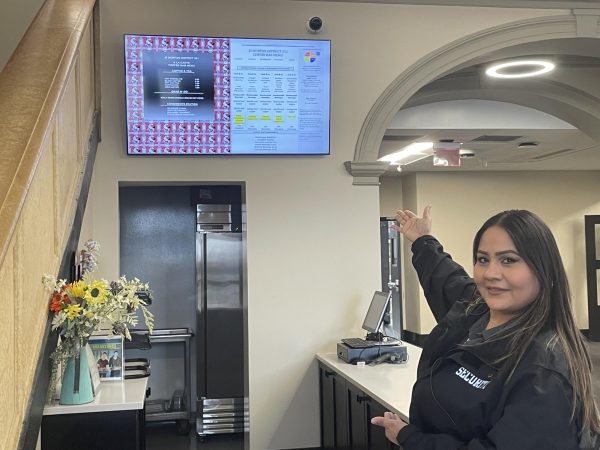Cicero/ Berwyn tap water could pose a possible threat?
October 17, 2018
Low levels of lead in tap water are not uncommon and are not harmful for human consumption, however researchers found high levels of lead in tap water for townspeople of Cicero and Berwyn in early August this year.
CPU tested 87 schools to check if they had lead in their water and found out that 26 schools had “at least one fixture that spouted water with lead amounts in excess of 15 parts per billion” (www.chicagotribune.com). “High levels of lead in tap water can cause health effects if the lead in the water enters the bloodstream and causes an elevated blood lead level” (htttps:// www.cdc.gov). The only way to know whether you have lead in your water is to have it tested. You can’t taste, or smell that you have lead in your water (htttps:// www.cdc.gov). Lead contamination comes from outdated plumbing or in many impoverished areas. “Lead leaches into the water supply when corrosive water comes in contact with pipes and breaks the metal down, which results in lead particles contaminating the water” (www.water-rightgroup.com). Lead testing kits are inaccurate and unreliable. “The best way to know if your water has lead is to have a state certified laboratory perform a test” (www.water-rightgroup.com). In a random survey 102 Morton East Students 75% said they think the Cicero tap water was unsafe.
“Unfortunately, water has many things, and there is a level of acceptance of what could be in the water I would want to know how much, I would want to do research and not just have one person tell me. But through little research find out if that level of lead is significant that it would affect my health” Candida Florence Mathieu said.
Clearly, Mathieu’s opinion is that water is known to contain various things that we might not be able to control, however there should be standards. Knowing this, small amounts of lead most likely are in tap water, but not as much as to impose an immediate health problem. High levels of lead in water can have drastic effects on people in particular children and pregnant women.
“it’s especially harmful to children that are developing. In fact, what we do right now is we test kids from 12 months up to the age of-right before they turn 7; we test them for lead because any lead in their system that is in higher amounts affects their development” Candida Florence Mathieu said
It’s clear that humans are not supposed to drink water containing high levels of lead. Detecting early signs of children who have possibly been affected by it are crucial in order to asses and diagnose the problem from getting worse. This issue does not only affect a small amount of people, it can affect towns with thousands of residents like parents, children and even pets. Many would likely not be happy to find out their water was of this quality and stand up.
“If I found out there was lead in the water, I’d want to do some research first. Before even getting mad and throwing myself out into the street with pitchforks, I’d find out what the government is doing, and then, you know, go on to the next step” Candida Florence Mathieu said
Mathieu believes consumers should do research first before anything because asking questions is crucial to getting the correct information. When in doubt, ask the people in charge.
“The school’s drinking water does not have to be tested. And, I have no idea about Cicero’s tap water being tested,” Mr. Gamboa, principal of Morton East, said.
As previously mentioned, knowing what is happening around the community is important, but there are alternatives to avoid the tap water if someone is unsure.
“I always drink filtered water or bottled, whether I’m at work or at home” Gamboa, Principal of Morton East, said.
The newer installed water fountains at East offer cold filtered water; students frequently fill up their water bottles there. Filtered water is considered safe.
“I don’t exactly know (how water is tested). I do know that Cook County in general tests for a certain amount of chemical, and it’s only the chemicals that are presumed to be there, but there’s a whole range of chemicals that are not tested. The tests are only for limited items and I believe it is only done once a year” an anonymous earth science teacher said.
Fortunately, the earth science teacher was knowledgeable to some degree as to the way that the water is tested. Tests on the water usually shouldn’t be a big deal unless a substantial number of lead particles have been found — possibly posing a threat to the community.
“The big deal about lead being in water is what the hazard is—you’re not going to go crazy—it basically stops your brain from functioning properly and if small children are exposed to it early in their lives then it’s going to have long standing repercussions for the rest of their lives—they’re going to be delayed and held back ,mentally, because of these toxins,” an anonymous earth science teacher said.
This shows, how the lead in the water really is an issue. Likely the symptoms are not noticed right away as it can become chronic. In turn the effects are long lasting on the future of the children and ability to live normal lives. It effects their life in virtually every aspect. And resolving it after it has been occurring is not easy to do so.
“You need to get your blood cleaned in order to get the lead out; that’s why it’s important for students to donate blood—somebody gets your blood indirectly you clean your blood,” an anonymous earth science teacher said.
So, it’s important to be aware of what we drink and consume because it affects us and could be harmful. Not detecting high levels of lead can leave chronic, ongoing effects for a person, therefore it this is important to avoid that from happening to someone.










